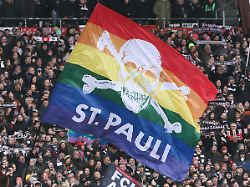With a cooperative in the first league?
How St. Pauli differentiates itself from its arch rivals when it comes to money
March 26, 2024, 4:15 p.m
Promotion to the Bundesliga is very close for FC St. Pauli. If you want to compete at the top, you also need a lot of money. For the Hamburg club it is clear: things shouldn’t go like that with their rival HSV with patrons and quarrels. And so the club takes an alternative route.
Ten points ahead, furious football celebrations at the Millerntor and promotion close in sight. FC St. Pauli is riding a wave of sporting success, but the neighborhood club is not immune to financial worries. “We need money to be able to compete in professional football in the long term,” it says on the club’s homepage. And because being different is firmly anchored in the club’s DNA, the Hamburgers are once again going their own way when it comes to developing new financial resources.
“There will be no patron and no spin-off here,” explains commercial manager Wilken Engelbracht. Unlike many first division clubs or city rivals Hamburger SV, major investors will not play a role in the future. Instead, the club wants to involve fans, members and supporters – with the help of a cooperative. Why? “Because it is the most Saint Paulian form of financing: grassroots-oriented, democratic, sustainable and particularly crisis-proof.”
This plan became concrete at the end of last year. A year that ended in financial difficulties for St. Pauli, not least because the corona pandemic had affected the club. President Oke Göttlich presented the idea at the general meeting and has been pushing it forward ever since. The cooperative is expected to be registered and founded in the first half of 2024, and the first members will be recruited before a year’s notice.
Cooperative should buy stadium
The club wants to continue to master the challenges of professional football in this way in the future, although the income will not flow directly into the first team. In the first step, the cooperative is to acquire the Millerntor Stadium; later the expansion of the youth performance center (NLZ) is planned. “This would show us that not only a different football, a different NLZ, but also different financing would be possible,” says Göttlich, who still has a lot of work to do.
Club members are currently being interviewed to work out details. It is a “highly complex process”, but: “We have the courage to take this step and to set up our own financing,” said the President.
The advantage of founding a cooperative is obvious for the member-run FC St. Pauli: the co-determination rights of the individual “mini investors” are strengthened – no matter how many shares a member owns, they only have one vote. A model that should also serve as a role model in the future, as financial boss Engelbracht emphasizes: “We don’t want to change things alone, we need clubs that share our view and go along with it.”
